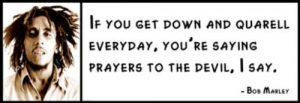Bob Marley and the Politics of Labeling
By: Kristiana Peric,
Interfaith Engagement Intern
“Me only have one ambition, y’know. I only have one thing I really like to see happen. I like to see mankind live together – black, white, Chinese, everyone – that’s all.” -Bob Marley
One of the most destructive weapons is the power of labeling. We humans obsess over our differences and giving each other names for these differences; abandoning our similarities that connect us as a people. When we put these labels over our own humanity, hatred brews and, as we’ve seen an unmeasurable amount of times throughout history, wars start. We have seen this (seemingly) endless spiral circulate time and time again unaware of all the harm that all began with just a label, the only thing that changes are the labels and our excuses for them. And as we’ve also seen time and time again throughout history is that the most impactful and peace-bearing leaders in this world have tossed aside the importance of labels- Dalai Lama, Nelson Mandela, Martin Luther King Jr., and my personal hero, Bob Marley. Bob Marley is more than just a reggae legend who smoked pot; Bob Marley is a prophet of the Rastafari religion who united people of many different labels through his music, his philosophy and his way of life.
Ever since he was born, Bob has been left in the middle of the battlefield with expectation and pressure to chose a side. Perhaps the most impactful one on his character, being between the dissonance with the labels of ‘black’ and ‘white’ he faced, considering the fact that Bob was half-white and half-black. Since childhood, Bob was rejected from his community and even family members for not being ‘black enough’ and was labeled as an outcast. The legend was ostracized and distrusted, belonging to no group since he was neither ‘white enough’ nor ‘black enough’. Having grown up in an environment that challenged his identity and constantly sanctioned him for all of his labels, along with no father and in depressing poverty, it baffles me to think how easy it can be for one to become angry and allow hatred to sour their heart-and instead finding a heart as pure and loving as Bob’s. I think that being forced out by both groups put Bob on the fence, and able to see both sides.
“I don’t stand on the black man’s side, I don’t stand on the white man’s side, I stand on God’s side.”
I believe that it became transparent to Bob in having his own intrinsic value undermined what the real issue was, and that was the division people created amongst each other. This prepared him for bigger battles later on during the 70s and 80s when Jamaica was going through a political war. Elections were being held after independence and political gangsters were shooting and killing others who belonged to the opposing political party, the far-right versus the far-left. During such a tense time, Bob Marley was the only one that was able to bring the people together to stop the mass killings, come together, ease the tensions and restore peace. He did this because in a time where he was, yet again, pressured into choosing a side, he remained on the side that will always be most important- and that is the side of the people and humanity.

“Politics is just… things that keep the people divided and foolish and put trust in men, and none of them can do anything for ya.”
Right now, our country has a lot to learn from this reggae star from Jamaica. In such a tense time where the value of our labels overrides everything, even our value as a person, we aren’t called to hold tighter onto something so shallow, but rather now is really the time that we should be letting go of and forgetting our labels. When we cling onto our labels and our differences, whether it is politics or race, that is really when we forget who we are and who our neighbors are, and that is people. Our country is now at a time where we obsessively dissect others’ labels and creating micro-wars with each other. As we see from Bob, it is when we strip off these labels and remember the human that stands behind them where we become free at heart.
“We should really love each other, In peace and harmony. Instead, we’re fussing and fighting. And them workin’ iniquity […] Like we ain’t supposed to be.”
-
The views and opinions expressed on The Falls are those of the authors and do not necessarily reflect the views or opinions of Niagara Foundation.
